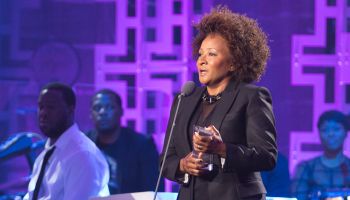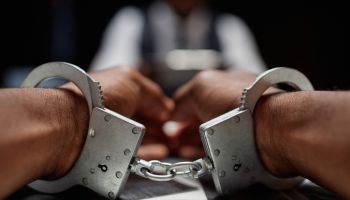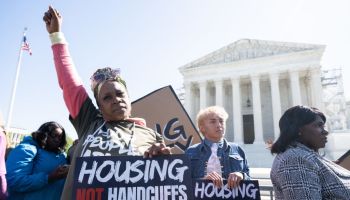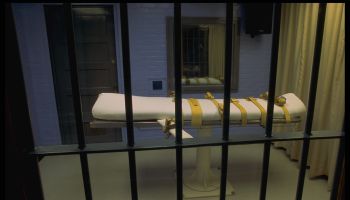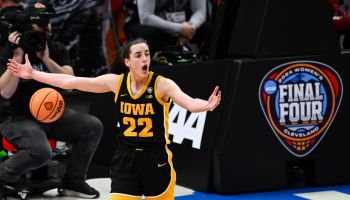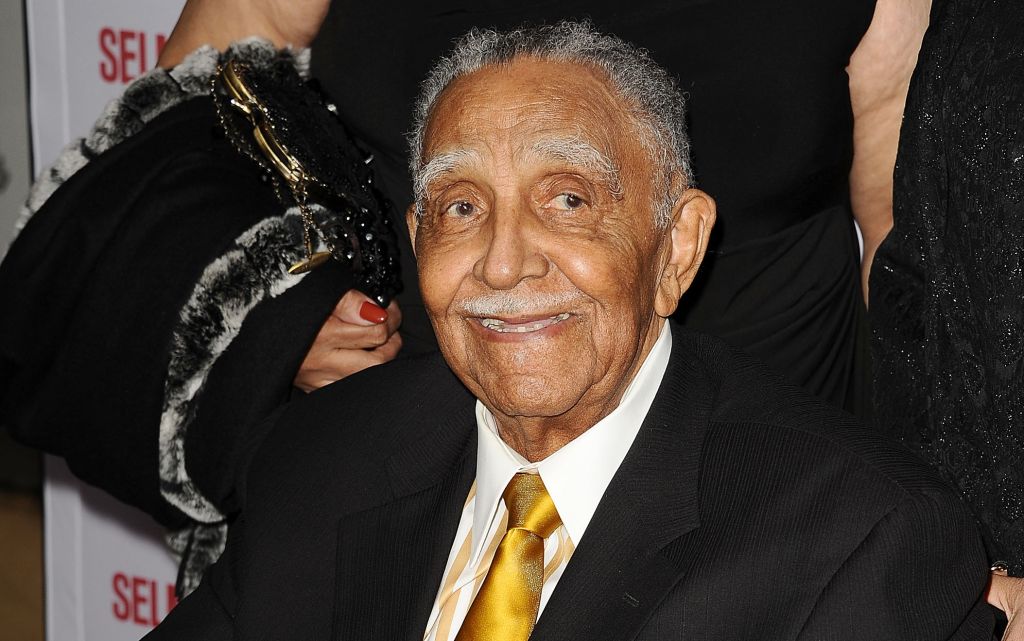
Source: Jason LaVeris / Getty
The Reverend Doctor Joseph E. Lowery (B.A., B.D., LL.D., D.D., L.H.D.) — hailed as the “Dean of the Civil Rights Movement” upon his receipt of the NAACP’s “Lifetime Achievement Award” — has assumed and executed a broad and diverse series of roles over the span of his eight decades: Leader, Pastor/Preacher, Servant, Father, Husband, Freedom Fighter and Advocate.
One milestone in this remarkable journey took place on August 12, 2009 when President Barack Obama awarded him the nation’s highest civilian honor — The Presidential Medal of Freedom, in recognition of his lifelong commitment to the nonviolent struggle for the causes of justice, human rights, economic equality, voting rights, peace and human dignity. Prior to that, on January 20, 2009, in his inimitable style; Dr. Lowery delivered the Benediction on the occasion of President Obama’s inauguration as the 44th President of the United States.
Born in Huntsville, Alabama, his legacy of service and struggle is long and rich. His genesis as a Civil Rights advocate dates to the early 1950’s where, in Mobile, Alabama he headed the Alabama Civic Affairs Association; the organization which led the movement to desegregate buses and public accommodations. In 1957, with friend and colleague, Dr. Martin Luther King Jr. he was a Co-founder of the Southern Christian Leadership Conference (SCLC) He served as Vice President (1957-67); Chairman of the Board (1967-77); and as President and Chief Executive Officer from Feb. 1977 – Jan.15, 1998.
In 1961, while still in Mobile, he was one of four Alabama pastors whose property was seized
by the Alabama Courts in an historic, precedent setting libel suit, Sullivan v. NY Times, Abernathy, Lowery, Shuttlesworth, & Seay, because of their civil rights work. The United States Supreme Court vindicated the ministers in a landmark ruling which defined and clarified constitutionally protected freedoms, and made possible the accurate and unfettered reporting of civil rights campaigns. To this day, the case is an important element in setting forth the protections afforded the free speech rights of the press, and of citizens advocating and protesting for justice and societal change (Read Make No Law by Anthony Lewis, 1964).
In March 1965, he was chosen by Dr. King to Chair the Delegation delivering the demands of the Selma-to-Montgomery March to Alabama Governor George Wallace. As the world witnessed, Wallace ordered the marchers beaten in the incident that came to be known as “Bloody Sunday” — an act that ultimately led to enactment of the Voting Rights Act.
Years later in 1995, as Dr. Lowery led the 30th Anniversary Re-enactment of the historic march, former Gov. Wallace personally apologized to him for his conduct.
In Birmingham, he served as president of the Interdenominational Ministerial Alliance, which spearheaded the hiring of the city’s first twenty Black police officers, among other accomplishments. He was also a leader in the movement in Nashville to desegregate public accommodations.
As president of SCLC, he negotiated covenants with major corporations for employment advances and business contracts with minority companies. He led one of the first protest campaigns against the Atlanta based Southern Company for contracting to purchase ten million tons of coal from South Africa (1977). He was among the first five persons arrested at the South African Embassy in Washington, D.C. in the “Free South Africa” campaign (1984). He co-chaired the 1990 Nelson Mandela visit to Atlanta following his release from prison, and awarded Mandela the SCLC/Martin Luther King, Jr. Human Rights Award.
In 1998, he was Keynote Speaker at the African Renaissance Dinner in Durban, South Africa honoring Mr. Mandela’s retirement. He was invited to keynote the dedication of a school and hospital in East Germany honoring Martin Luther King, Jr; led a Peace Delegation to the Middle East and met with the President of Lebanon and with Yasser Arafat to seek justice by non-violent means; led another Peace
Delegation to Central America; and led protests against the dumping of toxic waste in Warren County, N.C, where he was arrested twice, which gave birth to the environmental justice
movement.
He was arrested in Atlanta in 1968, fighting for the rights of City garbage workers. During the “Missing and Murdered Children’s crisis” in 1979, he was a leader in working for calm in the community, and in urging federal, state and local law enforcement agencies to maximize efforts to arrest the culprit(s). His message of “let us turn TO each other not ON each other!” was heard and embraced by the Atlanta community. He also provided offices for the “mothers” until they were able to secure their own space, and helped initiate a fund for them with Citizens Trust Bank.
Dr. Lowery led the historic Alabama to Washington pilgrimage (1982) to free Maggie Bozeman
and Julia Wilder, who had been falsely convicted of voter fraud. This march helped secure the extension of critical provisions of the Voting Rights Act through 2007. Nationally recognized as a strong proponent and advocate for affirmative action, he is a Cofounder and Chairman Emeritus of the Black Leadership Forum, a consortium of National Black Advocacy Organizations, where he served as its third President, following Vernon Jordan and Benjamin Hooks.
He served on the Board of Directors of MARTA (Metropolitan Atlanta Rapid Transit Authority)
for 23 years, and was chairman for three years (including during the ’96 Olympics). He was
instrumental in securing millions of dollars in contracts for minority businesses.
Since retiring from SCLC in January 1998, he has helped Black farmers settle a discrimination
suit in Federal Court valued at $2 billion against the Department of Agriculture. He assisted
black auto dealers seeking redress from discrimination claims against auto manufacturers, and
has supported black concert promoters in their fight against exclusionary policies of talent
agencies.
As Convener of the Georgia Coalition for the People’s Agenda (GCPA), he is active in election
reform and voter empowerment, economic justice, criminal justice reform, including alternative
sentencing and a moratorium on the death penalty. He is in frequent demand as a speaker across
the nation and on college campuses.
Recognition of Dr. Lowery’s contributions and service has been diverse and meaningful. As part of the celebration of his birthday on October 6, 2001, Clark-Atlanta University announced the establishment of the Joseph E. Lowery Institute for Justice & Human and Rights. The Institute seeks to provide a forum for dialogue and a laboratory for research and analysis of issues related to human rights, workers’ rights, civic engagement, voting rights, Antipoverty measures, environmental and sustainability matters, racism, sexism and economic justice. In addition, the Atlanta Board of Education instituted the Annual Joseph E. Lowery Lecture Series on Civic Participation, and the Atlanta City Council changed the name of Ashby Street to Joseph E. Lowery Boulevard. At its 2003 commencement, the University of Alabama awarded him the Honorary Degree of Doctor of Humane Letters. Boston University chose him to receive its first Martin Luther King, Jr. award, and Wayne State University gave him the first Walter Reuther Humanitarian Award.
Ebony Magazine, in recognizing Dr. Lowery as one of the nation’s “15 Greatest Black Preachers,” described him as the “consummate voice of biblical social relevancy, a focused prophetic voice, speaking truth to power”. He was internationally celebrated and admired for just such inspired and bold messages of “truth” when he delivered eulogies at the funerals of Rosa Parks and Coretta Scott King. One commentator observed that… “He prophetically and poetically memorialized a life devoted to peace and justice at the funeral of Mrs. King before presidents, governors and lawmakers and a world-wide television audience….. in an unprecedented opportunity to speak truth directly to power.”
As a United Methodist minister, he was elected as delegate to three General Conferences, and presided over an Annual Conference (Acting Bishop) in 1966. His prophetic voice was instrumental in moving the Church toward the goal of inclusiveness. He served as pastor of United Methodist churches in Mobile and Birmingham, Alabama, and in Atlanta, Georgia, where he pastored Central United Methodist Church for 18 years.
As an historic note, it was in this Church, that Clark College was organized. During his tenure at Central, thousands of new members were added to the Church, and Central Methodist Gardens — a 240 unit Housing Development was constructed for low and moderate-income families.
He served as Pastor of Cascade United Methodist from 1986-1992. Upon his retirement, he left the Church $1 million, ten acres of land, and blueprints for the new edifice—which has since been constructed. He is married to the late Evelyn Gibson Lowery, founder of SCLC/W.O.M.E.N, and an activist in her own right. He is the father of five children.
Educational Studies
Alabama A&M University
Knoxville College
Payne College & Theological Seminary
Chicago Ecumenical Institute
Honorary Doctorates
Emory University Doctor of Divinity (2010)
University of Alabama (2003)
Morehouse College
Clark Atlanta University
Alabama State University
Central State University
Miles College
Beloit College
Atlanta University*
Dillard University
Paine College
Clark College*
*prior to merger
Selected Awards & Honors
2011, Congressional Black Caucus, Phoenix Award
2011, Alpha Phi Alpha Fraternity, “ Lifetime Courage Award”
2011, National Education Association, “Lifetime Achievement Award”
2011, Morehouse College, “Gandhi – King Ikeda Award”
2011, SCLC W.O.M.E.N., Inc., “Drum Major for Justice Award for Civil Rights”
2011, Georgetown University and Kennedy Center, “John Thompson Jr. Legacy of a Dream Award”
2010, Georgia Stand-Up, “Visionary Leader Award”
2010, Atlanta Urban League, “Equal Opportunity Award”
2010, Concerned Black Clergy,” Bishop C. Henderson President’s Award”
2008, John Marshall Law School, ‘Fred Gray Social Justice Award”
2008, New York State United Teachers, “Albert Shanker Award”
2008, National Alliance of Black School Educators and Administrators “Living Legend Award”
2008, National Coalition of 100 Black Women, Inc., Atlanta Chapter, Humanitarian Award
2007, State of Georgia Civil Rights Department/Commission on Equal Opportunity’s Leadership in Civil
Rights Award
2007, Atlanta Business League, Men of Influence, Legend’s Hall of Fame
2006, State of Georgia, Secretary of State’s Outstanding Georgia Citizen Award
2004, National Urban League’s Whitney M. Young, Jr. Lifetime Achievement Award
2002, Concerned Black Clergy Salute to Black Fathers Lifetime Achievement Award
2002, Black Leadership Forum’s Lifetime Achievement Award
Committee to Abolish Death Penalty Award
Southern Center for Human Rights Award
Operation PUSH/Rainbow Coalition’s Achievement Award
Black Methodists for Church Renewal Leadership Award
NAACP LIFETIME ACHIEVEMENT AWARD
Southern Regional Council Life Fellow
World Peace Council Award
United Auto Workers Civil Rights Award
